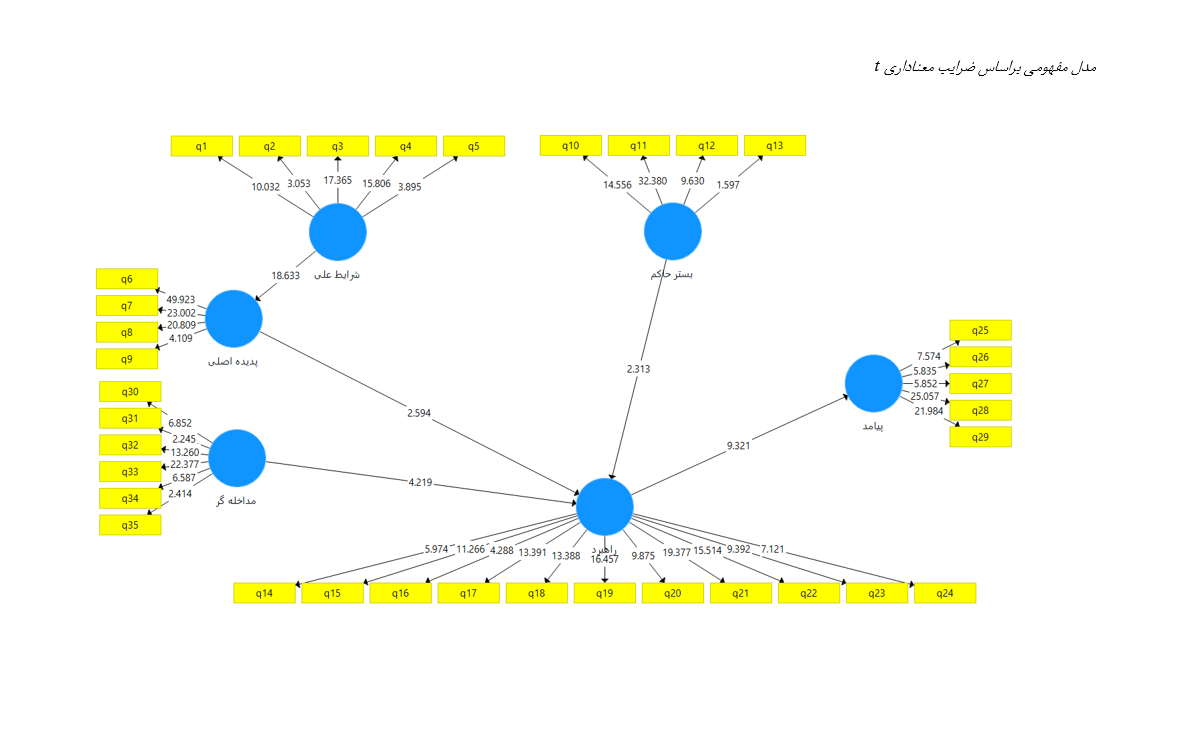سنجش الگوی تجربه برند با تأکید بر رفتار شهروندی مشتریان در صنعت بانکداری
کلمات کلیدی:
تجربه برند, کیفیت ارتباط برند, شخصیت برند, دلبستگی برندچکیده
امروزه برند و برندسازی در صنعت خدمات مالی و بانکی از اهمیت خاصی برخوردار است. اهمیتی که تقریباً تمامی جوانب سازمان را دربرگرفته و نقشی حیاتی در بقاء، رشد و تعالی سازمان دارد. پژوهش حاضر با هدف سنجش الگوی تجربه برند با رفتار شهروندی مشتریان در صنعت بانکداری انجام شده است. این پژوهش از لحاظ هدف، کاربردی و از نظر ماهیت و روش، اکتشافی است. جامعه آماری کل مشتریان شعب بانک ملّی شهر تهران میباشند. حجم نمونه 384 نفر میباشد. دادهها بوسیله پرسشنامه محققساخته و روش نمونهگیری تصادفی ساده و در دسترس استفاده شد. برای سنجش اعتبار پرسشنامه از روش آلفای کرونباخ، پایایی ترکیبی، روایی واگرا و روایی همگرا استفاده گردید. روش تحلیل دادهها مدلسازی معادلات ساختاری است که با نرمافزار آماریSmart PLS4 انجام پذیرفت. از 5 فرضیه مورد بررسی، تمام فرضیهها (تأثیر شخصیت برند بر تجربه برند، تأثیر تجربه برند بر دلبستگی برند، تأثیر کیفیت ارتباط برند بر دلبستگی برند، تأثیر زیرساختها بر دلبستگی برند، تأثیر دلبستگی برند بر رفتار شهروندی مشتریان) مورد پذیرش قرار گرفتند. این پژوهش استراتژیها و پیشنهادات کاربردی در رابطه با هر یک از عوامل مؤثر بر مدل تجربه برند در بانک ملّی و براساس شاخصهای شناسایی شده در این پژوهش ارائه داد.
دانلودها
مراجع
Aaker, J. L. (1997). Dimensions of brand personality. Journal of Marketing Research, 34(3), 347-356. https://doi.org/10.1177/002224379703400304
Davari, A., & Rezazadeh, A. (2017). Structural equation modeling with software PLS. Academic Jihad Publishing Organization.
Gentile, C., Spiller, N., & Noci, G. (2007). How to sustain the customer experience: An overview of experience components that co-create value with the customer. European Management Journal, 25(5), 395-410. https://doi.org/10.1016/j.emj.2007.08.005
Gilde, C., Pace, S., Pervan, S. J., & Strong, C. (2011). Examining the boundary conditions of customer citizenship behaviour: a focus on consumption ritual. Journal of Strategic Marketing, 19(7), 619-631. https://doi.org/10.1080/0965254X.2011.603053
Gong, T., & Wang, C. Y. (2023). Unpacking the relationship between customer citizenship behavior and dysfunctional customer behavior: the role of customer moral credits and entitlement. Journal of Service Theory and Practice, 33(1), 110-137. https://doi.org/10.1108/JSTP-12-2021-0256
Hamdam, H., Ebrahimi, A., Feyzi, M., & Khaleghi, M. (2013). Investigation of customer citizenship behavior. The second international conference on management in the 21st century, Tehran.
Harisandi, P., Hurriyati, R., & Dewi, P. (2023). Influence of Brand Equity on Electronic-Word of Mouth Mediated by Brand Love on Shopee E-Commerce. International Journal of Marketing and Research Studies, 2(1), 83-98. https://doi.org/10.59653/ijmars.v2i01.357
Hernani-Merino, M., Libaque-Saenz, C. F., & Dávalos, J. (2023). Antecedents and consequences of customer inspiration: a framework in the context of electronic device brands. Journal of Product & Brand Management. https://doi.org/10.1108/JPBM-12-2021-3799
Kasemsap, K. (2018). The roles of social media marketing and brand management in global marketing. In Social media marketing: Breakthroughs in research and practice (pp. 425-453). IGI Global. https://doi.org/10.4018/978-1-5225-5637-4.ch021
Kotler, P., & Armstrong, G. (2017). Principles of Marketing. Pearson. https://books.google.ch/books/about/Principles_of_Marketing.html?id=5HkrAQAAMAAJ&redir_esc=y
Moedeen, S., Aw, E. C. X., Alryalat, M., Wei-Han Tan, G., Cham, T. H., Ooi, K. B., & Dwivedi, Y. K. (2024). Social media marketing in the digital age: empower consumers to win big? Asia Pacific Journal of Marketing and Logistics, 36(1), 66-84. https://doi.org/10.1108/APJML-09-2022-0784
Moorthi, Y. L. R., & Mohan, B. C. (2017). Brand value proposition for bank customers in India. International Journal of Bank Marketing, 35(1), 24-44. https://doi.org/10.1108/IJBM-09-2015-0132
Norouzi, H., & Teimourfamian Asl, R. (2023). Investigating the effects of corporate social responsibility on customer citizenship behavior with the mediating roles of corporate image and perceived service quality. Social Responsibility Journal, 19(10), 1885-1899. https://doi.org/10.1108/SRJ-10-2022-0461
Park, C. W., MacInnis, D. J., Priester, J., Eisingerich, A. B., & Iacobucci, D. (2010). Brand attachment and brand attitude strength: Conceptual and empirical differentiation of two critical brand equity drivers. Journal of Marketing, 74(6), 1-17. https://doi.org/10.1509/jmkg.74.6.1
Sudhana, P., Noermijati, N., Sabil Hussein, A., & Khusniyah Indrawati, N. (2023). A moderated mediation analysis of the low enrollment intention at international higher education in Indonesia. International Journal of Public Sector Management, 36(4/5), 333-349. https://doi.org/10.1108/IJPSM-12-2021-0271
Xie, L., Poon, P., & Zhang, W. (2017). Brand experience and customer citizenship behavior: the role of brand relationship quality. Journal of Consumer Marketing, 34(3), 268-280. https://doi.org/10.1108/JCM-02-2016-1726
Yasri, Y., & Budiarti, A. (2023). Millennials Brand Love of Regional Specialties Food: The Role of Brand Authenticity and Brand Trust. Proceedings of the 5th International Conference on Economics, Business and Economic Education Science, ICE-BEES 2022, 9-10 August 2022, Semarang, Indonesia,
Zarantonello, L., & Schmitt, B. H. (2010). Using the brand experience scale to profile consumers and predict consumer behaviour. Journal of Brand Management, 17, 532-540. https://doi.org/10.1057/bm.2010.4

دانلود
چاپ شده
ارسال
بازنگری
پذیرش
شماره
نوع مقاله
مجوز
حق نشر 1404 Mina RezaSoltani (Author); Shahrbanoo Gholipour Fereidooni; SeyyedAli Nabavi Chashmi, Mojtaba Maleki (Author)

این پروژه تحت مجوز بین المللی Creative Commons Attribution-NonCommercial 4.0 می باشد.










